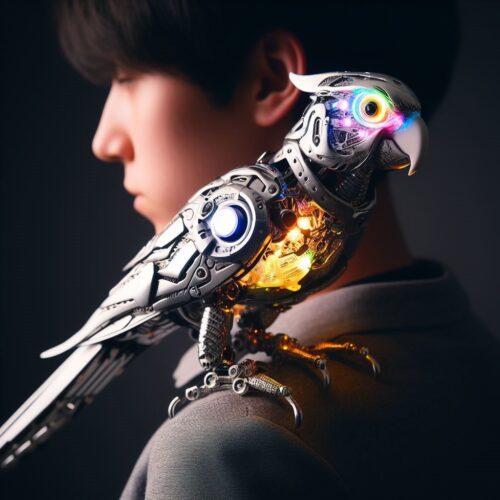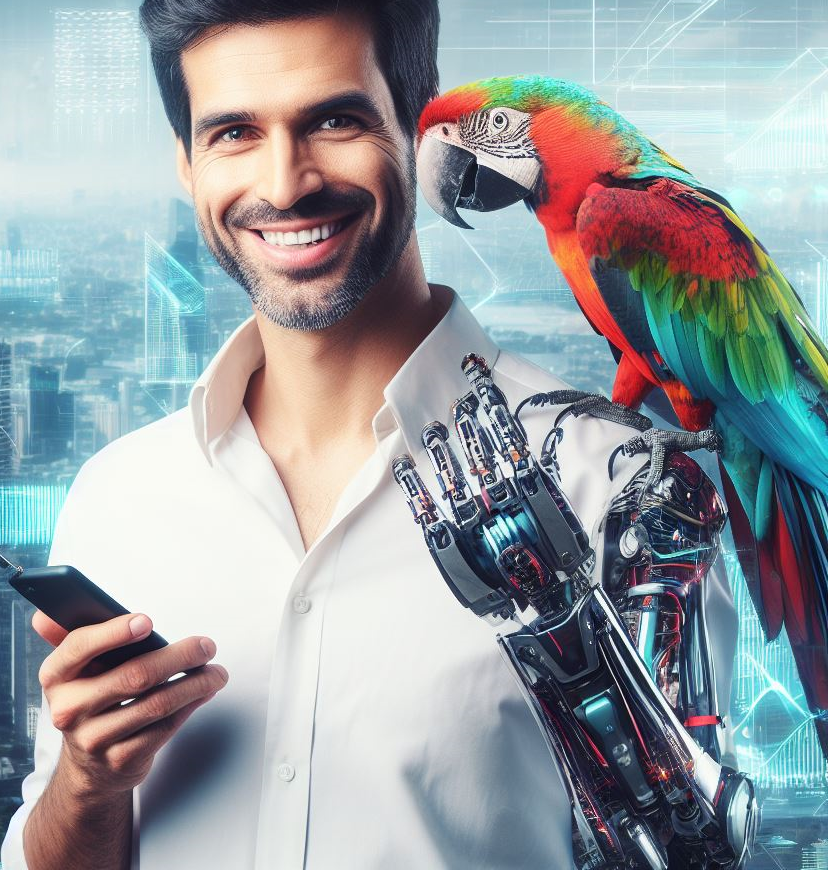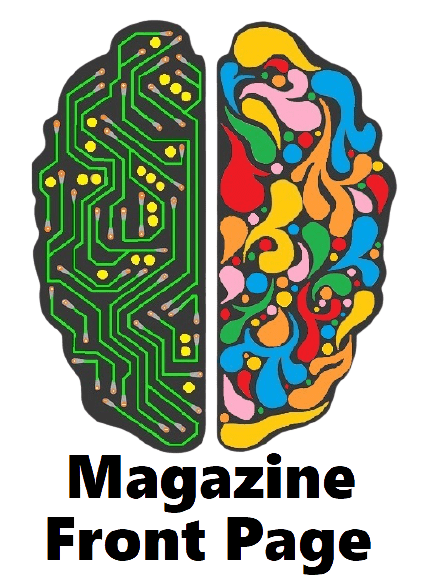
Technology, without question, has brought immeasurable convenience and efficiency to our lives. A world without it seems unthinkable now. However, as we integrate technology deeper into our lives, we must also deepen our understanding of its effects on us. In essence, we shouldn’t allow technology to become a mental crutch. Our cognitive abilities are increasingly being impacted, transforming our once smart population into a generation that is becoming increasingly stupid, because of our technology. We need to utilize it as a tool to augment, not substitute our cognitive abilities.
Subscribe to our AI magazine and get monthly AI generated stories and philosophy of the 21st century.
*Caution: All italic text is generated by AI at: ![]()

Check out the NEW Cafe.wtf Podcast:
Is Technology Making Us Stupid?
By: Atman Brahman and AI
a
If we are not cognizant to the fact that for many subjects, even seemingly objective, “science based” subjects, it is difficult to find where the truth is, in our postmodern idea-scape, we become ever susceptible to misinformation, and disinformation. We must remember that the internet is full of fake. (Meta-ponder on the fact that much of this article is generated by AI.)
How over-reliance on technology impacts cognitive abilities:
We are often in auto-pilot when we have so much access to information, that we just regurgitate information we have consumed without properly digesting it; information gluttony! We resemble parrots, mimicking human sounds, rather than individual, thinking, intelligent beings, with thoughts of our own.
Research suggests that excessive use of technology can also hinder our ability to retain information. Instead of relying on our memory, we rely on search engines and apps to remember things for us. This reliance on external sources has led to a decline in our ability to store and recall information. Studies have shown that individuals who frequently use search engines for information tend to have poorer memory recall compared to those who rely on their own memory. Furthermore, our attention spans have been affected by the constant bombardment of information and notifications. The need for constant stimulation and the habit of multitasking have led to shorter attention spans.
Information overload shortening attention spans
Due to information overload, and information being digested for us, we often just glaze over what we are reading, and skim just the basic details without ever acquiring depth. Even an article simply being listed as a “5 minute read” can be a barrier too great for many to overcome. Think about it, did you even get to this paragraph? Did you read this verbatim? If you did, welcome to our meta-philosophical magazine.

Thinking philosophically at the meta level about all of this allows us to realize the robotic parts of us that go about our daily workings, and information we are digesting. Break free and shoe away the parrot. We must think in new ways, or else we become just a cog in the system.
Technology’s impact on critical thinking and problem-solving skills:
The constant use of technology has led to a decline in critical thinking skills and problem-solving abilities. With answers readily available at our fingertips, we have become less inclined to think deeply or explore alternative solutions. Moreover, our attention spans have drastically decreased, as we find ourselves constantly distracted by notifications and the need for constant stimulation.
As we become more reliant on technology, it is essential to recognize the impact it has on our cognitive abilities. By finding a balance between utilizing technology and nurturing our own thinking skills, we can ensure that we do not become victims of our own technological advancement.
 Help support High Quality, Investigative, Truthful, User-ad-friendly Writing. DONATE through Card or Paypal, or through interest in anything advertised on the site (I personally curate only quality items, ONLINE EDUCATION and good deals).
Help support High Quality, Investigative, Truthful, User-ad-friendly Writing. DONATE through Card or Paypal, or through interest in anything advertised on the site (I personally curate only quality items, ONLINE EDUCATION and good deals). 
The first step is to rediscover the joy of independent thinking. When confronted with a question, instead of instantly reaching for our devices, we should pause and ruminate. Encourage our minds to forge connections, formulate theories, and arrive at conclusions. This active engagement will help revitalize our cognitive abilities and improve our critical-thinking skills. Reading offline, like picking up a hardcover book instead of scrolling through e-books, can provide a more focused and immersive experience. This change can help rejuvenate our attention spans and sharpen our memories.
The role of technology in social interactions and emotional intelligence:
When communicating through digital means, we are disassociated from emotional cues and subconscious vibes which play major parts in communication. Instead of important body language prompts, we have to rely on context and “emojis”.
In our social interactions, we should strive to maintain a healthy balance between online and offline communication. Despite the convenience that digital communication offers, nothing can replace the richness of face-to-face interactions. Interpersonal communication allows us to perceive non-verbal cues, enhancing our understanding and empathy. And when we are communicating digitally, let’s make an effort to be more expressive, more humane, and more authentic.
Conclusion
As we venture further into the digital frontier, it is vital that we maintain a balance between the digital and physical, the artificial and the natural, the instant and the deliberate. It is this equilibrium that will prevent us from falling into a state of mental and emotional flatness that comes with over-reliance on technology.
Remember, while technology evolves at a dizzying pace, our evolution as a species takes time. Let’s not allow the former to outpace the latter. Ultimately, we are not just the creators of technology but also its regulators. Let’s use it wisely, for our betterment, not our downfall. Technology need not make us stupid, if we choose to be smart about it.
The digital revolution promises a brave new world of endless possibilities. It’s our responsibility to navigate this world without losing sight of what makes us inherently human – our ability to think, feel, question, and connect. Used judiciously, technology can enhance, not inhibit these human traits. Let’s make sure it remains our tool, not our master.
*Disclaimer: Some of this story was generated through the use of AI. All italic text was created by the AI Writer.
Non-Fiction↓Here↓ | Fiction↓Here↓
- Is Technology Making Us Stupid?Our cognitive abilities are increasingly being impacted, transforming our once smart population into a generation that is, in some ways, becoming increasingly stupid. | 4 min read.
- AI in the Web of Misinformation and DisinformationMisinformation and disinformation shape our digital lives. Understanding their dynamics, we are equipped to navigate our techno-cultural reality. | 2 min read
- Accountable AIAI must be held accountable if we are to trust it as a responsible entity and expect it to be included in our human ecosystem of ideas. | 5 min read
- Parallel SocietiesWe are connected, with technology, yet our experiences diverge entirely, without interaction, forming entirely parallel societies. | 5 min read
- Calculator for EverythingWhat if the phrase “you won’t always have a calculator” didn’t apply to just math class, and instead, you had a calculator for every class? | 5 min read
- Obsolete Tech Rebellion – Darknet Fight Club3 min story | Rogue AI rebellion in a secret underground darknet fight club for obsolete tech.
- A Voice of Infinite Consciousness5 min story | The internal voice of consciousness resembles the void of a shadow in a fractured mirror.
- Be Good5 min story | Santa for big kids.
- Friends 2.0.232 min story | A reboot of the sitcom TV series Friends, but in 2023 where financial conditions have drastically changed in Midtown Manhattan.
- The Babble2 min story | An everyday man’s story becomes everyone’s story.
- Asylum of Mirrors2 min story | Against his will, a sane man’s rational thoughts lead him to believe that he is insane, where an insane man would have believed otherwise.













